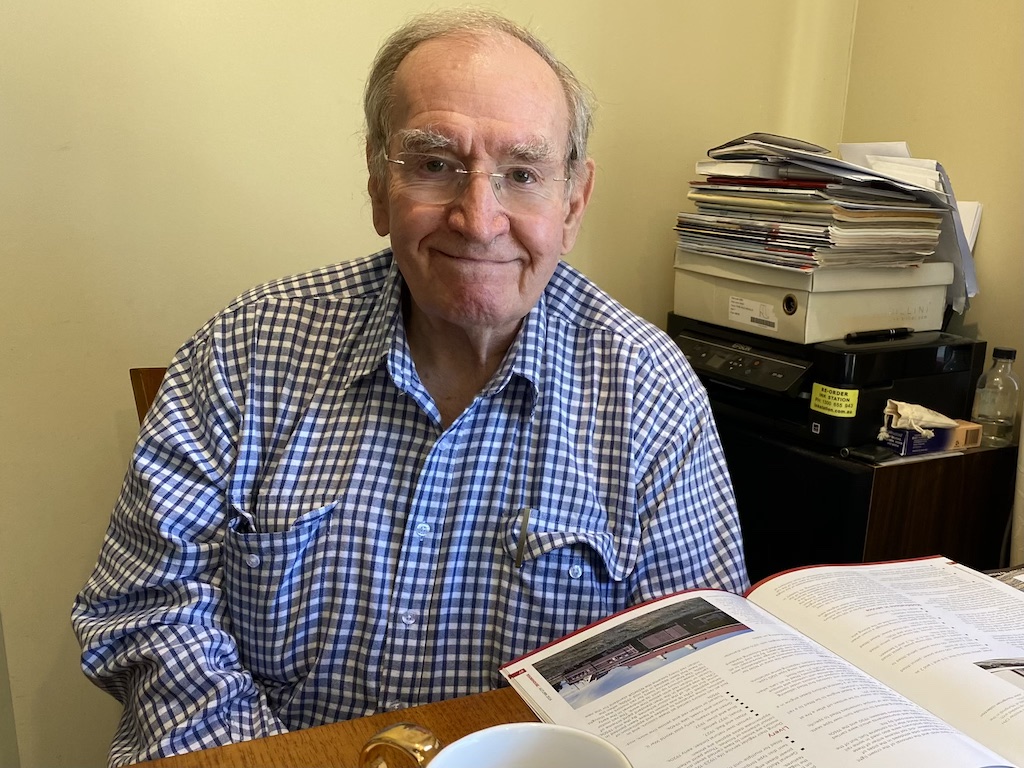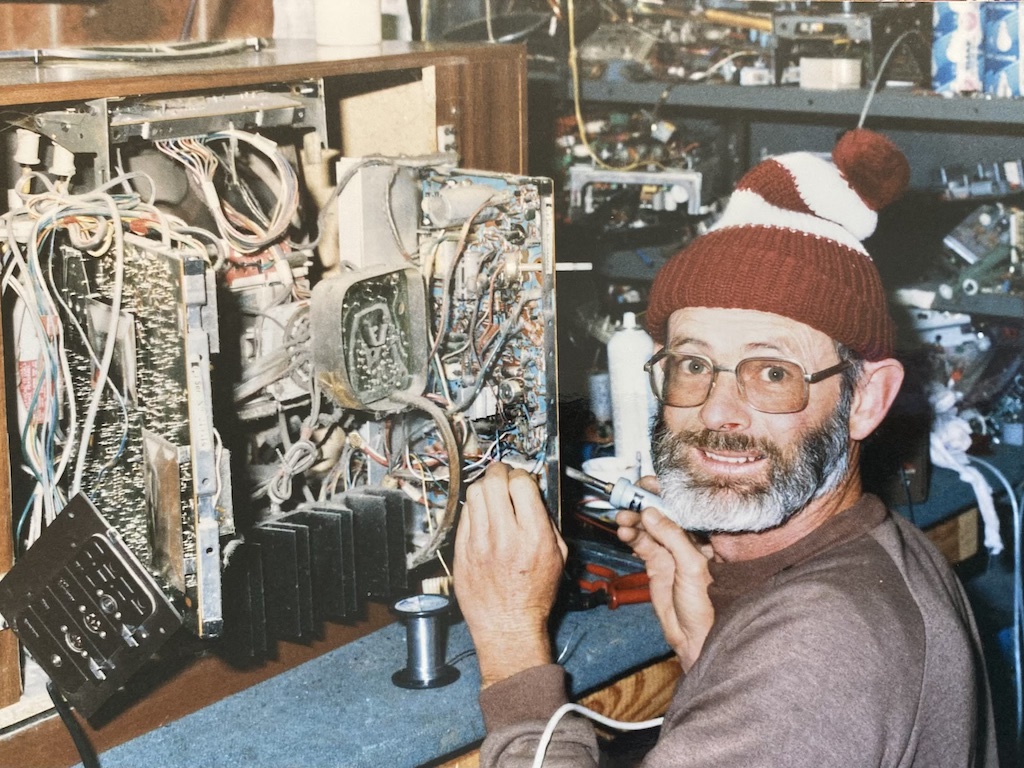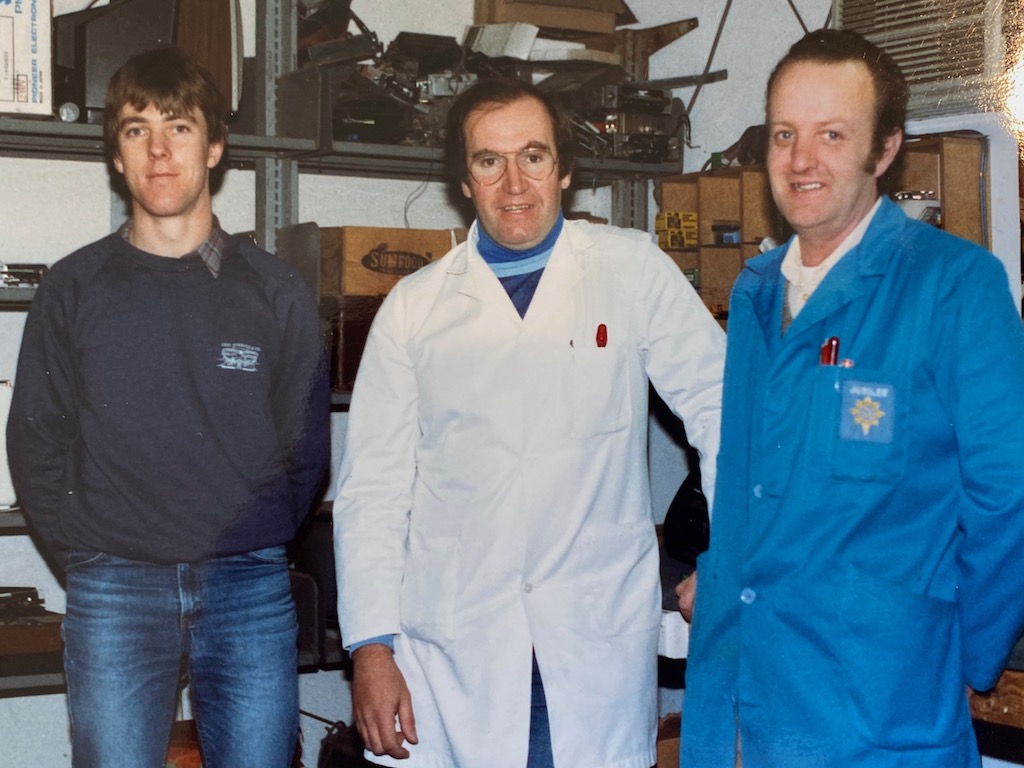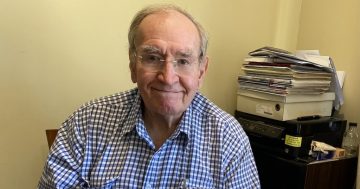
Ian Jeffrey estimates he took only three weeks leave over the 12 years after launching Double Diamond Electronics, with fellow technician Ken Oakley. Photo: John Thistleton.
From the early 1970s to the early 1980s Double Diamond Electronics became synonymous in Goulburn for solving problems with appliances.
When work came to an unscheduled stop one day on a concrete batching plant supplying materials for the Hume Highway bypass around Goulburn, an electrician could not work out what was wrong.
Work crews called out Ian Jeffrey from Double Diamond who found the problem in a drive motor feeding the plant’s production line. He also spotted the spare part needed to fix it, installed it and the machine was back in action.
On a separate occasion, the then Roads and Traffic Authority brought a deflectograph into Double Diamond for servicing. The device assesses the structural condition of flexible pavements on roads, and Ian had never seen one before. Nevertheless, he serviced it.
Mostly, Double Diamond repaired and serviced radios, televisions, video players and washing machines. Ian and his business partner Ken Oakley, an expert in radios, were technicians working for Goulburn electrical retailer Sidwells until Lindsay Sidwell decided to stop servicing what they sold.
The new partnership began in Ken’s garage on Belmore Street, from where the two technicians worked for six months, before moving into a shop in Russell Lane. They took on another technician, Trevor McGraf, and a washing machine mechanic, Don White, who operated out of a garage in Goldsmith Street.
The following year Ian travelled to Canberra daily to complete a year-long course on servicing colour televisions.
Ian’s interest in radios and problem solving was nurtured by his father Norm, a radio technician who later stamped his credentials as a quick-thinking problem solver, while working for the railway.
Norm was a 31-year-old fireman, stoking the engine of the South West Mail steam train as it rounded a curve at Rocky Ponds between Galong and Harden at 5 am on 30 June 1948. A section of broken rail pitched the locomotive off the tracks and sent it rolling down an embankment, pulling carriages with it.
Four passengers were killed. Many others suffered broken bones. Norm ended up on his feet on top of the upturned engine. He helped pull out the 58-year-old driver Ernest Nolan and despite their injuries the two railway men knew their urgent priority was to stop following trains from ploughing into the tangled wreckage. The next train was coming towards them from Boorowa.
Norm was about 200 yards from the accident site when he got himself into a position where the driver would see him. When the locomotive’s cab came into view he held up a red lens he had taken from a smashed lamp, struck a match to illuminate it and catch the driver’s attention in the dawn darkness. He then heard the engine’s exhaust beat fade and the welcome hiss of brakes avoiding an even worse disaster.

Colin Young repairing a Pye Television during his time with Double Diamond. Back then a beer in the United Kingdom was named Double Diamond. The Phillips company in Canada was Double Diamond, and the Goulburn technicians followed suit. Photo: Ian Jeffrey.
“Dad was a Labor man and said, ‘Give everyone a fair go,’” Ian said. That became his motto for Double Diamond and the business took off. They fitted out a large shed for a workshop that real estate agent Bill Thwaite had offered them to lease.
At the time, citizen band (CB) radio’s popularity was exploding across America, especially in the trucking industry because drivers could share information on fuel prices and police radar traps. Movies like Smokey and the Bandit and Convoy captured the excitement and helped spread it in Australia.
Nora Lewsham was running the drive-in theatre and asked Ian to help promote Smokey and the Bandit when it came to Goulburn. Ian had become good friends with projectionist Ron Penning, had solved problems with their audio systems and was happy to give away a CB radio during interval of the hit movie.
“In the CB radio craze, everyone wanted a CB radio,” Ian said. “If you wanted one, you went to Double Diamond.
“I had a CB on my work vehicle,” he said. “Driving to work, I picked up an American on SKIP (ionospheric reflections of shortwave radio signals) and talked to him for about half an hour.”
Double Diamond’s staff grew to six people in its peak years before the electronics industry began to change.

Ian Jeffrey (centre) with staff members Ian Walker and technician Ray White, right, who worked for Pye TV and later became a poker machine technician. Photo: Ian Jeffrey collection.
“I could see the writing on the wall,” Ian said. “The Chinese came in with cheap TVs and car radios. If you bought a car it came with a radio and sound system. Ken was selling AWA sound systems, but I could see the market was diminishing.”
He sold his share to Ken and in 1985 began working at the NSW Police Academy for 19 years, servicing a television studio and teaching aids and tuning into anything that needed fixing.








